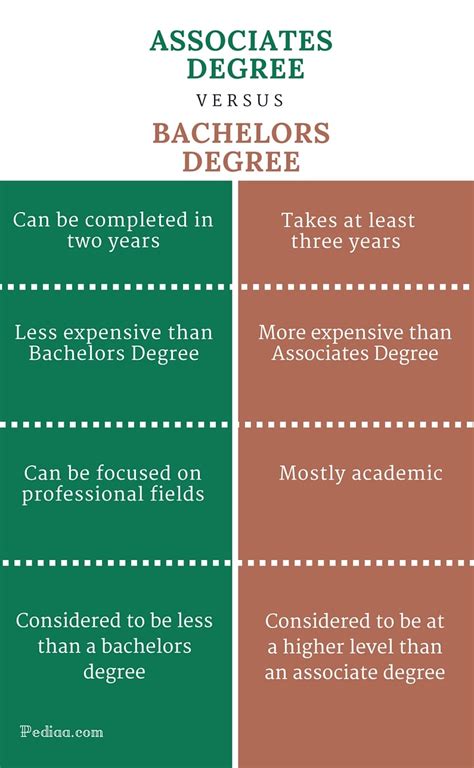Introduction
In the labyrinthine realm of higher education, the choice between an associate and a bachelor’s degree can be a crossroads that shapes your career trajectory. Understanding the fundamental differences between these two qualifications is paramount for making an informed decision aligned with your aspirations and goals.

Academic Rigor and Duration
An associate degree, typically requiring 60-75 credit hours, emphasizes vocational training and practical skills in specific fields. It can be completed in approximately two years.
On the other hand, a bachelor’s degree encompasses a broader academic foundation, requiring 120-180 credit hours. It takes around four years to complete and involves a comprehensive curriculum that includes core liberal arts courses, a major, and electives.
Career Prospects and Earning Potential
Associate degree holders often enter the workforce with specialized technical skills, making them eligible for entry-level positions in fields such as nursing, automotive repair, or information technology. They typically earn higher salaries than individuals with only a high school diploma.
Bachelor’s degree graduates possess a more versatile skillset and can pursue a wider range of career paths. They are often sought after for managerial, research, or professional roles, and generally command higher salaries than those with associate degrees.
Further Education Opportunities
An associate degree can provide a stepping stone to a bachelor’s degree. Many community colleges offer transfer programs that allow students to earn an associate degree and then seamlessly transition to a bachelor’s program at a university.
Cost and Investment
The cost of a degree varies depending on the institution, location, and program. Associate degrees are generally less expensive than bachelor’s degrees due to their shorter duration and narrower scope. However, the long-term investment potential of a bachelor’s degree should be considered.
Common Mistakes to Avoid
- Assuming that an associate degree is inferior: Associate degrees can provide valuable skills and lead to rewarding careers.
- Overestimating the earning potential of an associate degree: While associate degree holders can earn more than those with only a high school diploma, their salaries may not match the earning potential of bachelor’s degree graduates.
- Underestimating the time and effort required for a bachelor’s degree: Pursuing a bachelor’s degree requires significant time, effort, and financial investment.
Pros and Cons Comparison
| Feature | Associate Degree | Bachelor’s Degree |
|---|---|---|
| Duration | 2 years | 4 years |
| Credit Hours | 60-75 | 120-180 |
| Focus | Vocational training | Broad academic foundation |
| Career Prospects | Entry-level positions | Wide range of careers |
| Earning Potential | Higher than high school diploma | Generally higher than associate degree |
| Further Education | Can lead to bachelor’s degree | Opens doors to graduate programs |
| Cost | Less expensive | More expensive |
Tailoring Your Decision to Your Goals
The best choice between an associate and a bachelor’s degree depends on your individual aspirations and career goals. Consider the following questions:
- What are your immediate and long-term career goals?
- Which degree offers the best preparation for your desired career path?
- What is your financial situation and how much time and effort can you commit to your education?
- Are there any transfer programs available that can provide a seamless transition from an associate to a bachelor’s degree?
Conclusion
The choice between an associate and a bachelor’s degree is a pivotal decision that can shape your career and life trajectory. By carefully considering the differences between these two qualifications, you can make an informed decision that aligns with your goals and maximizes your earning potential. Remember, the path to success is paved with the right educational foundation and a commitment to continuous learning.
